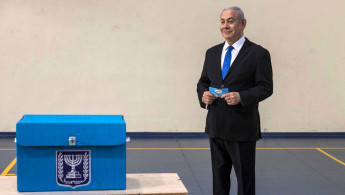Netanyahu breaches Israeli election law with radio interview on election day
Israeli Prime Minister Benjamin Netanyahu broke Israeli election laws by giving a radio interview on election day.
The premier, who is seeking a fifth term despite corruption allegations against him, gave an interview to Galey Yisrael radio station, Haaretz reported.
The move by Netanyahu is in breach of section 129 of Israeli Election Law.
Last week, the head of the Central Election Committee, Justice Hanan Melcer, made clear that radio and television interviews with candidates is forbidden on election day.
Voting began Tuesday in Israel's second election in five months that will decide whether to extend Prime Minister Netanyahu's term as the country's longest-serving prime minister.
Netanyahu also violated propaganda law on Monday, according to the Central Election Committee, when he published poll statistics in the days running up to the election.
Polls opened at 7am and were due to close in most areas at 10pm. Some 6.4 million people are eligible to vote.
The first exit surveys will be released just after polls close, while official results are not expected until Wednesday.
There were early signs that concerns over election fatigue may not materialise.
As of 10am on Tuesday, some 15 percent of Israelis had already cast their ballots. It marked more than a 2 percent increase over the figure at the same time in April.
Tuesday's turnout is the highest by that time since 1984, according to the election committee.
Voter turnout has emerged as a key element of this election. Election day is a national holiday, a measure aimed at encouraging participation.
In April's election, turnout was about 69 percent, slightly below the 72 percent figure in the previous election in 2015.
But turnout in the minority Palestinian citizens of Israel sector was just below 50 percent and many Arab voters have boycotted the election.
The various Palestinian-Israeli leaders have handed together on a joint list for this election, hoping to boost turnout.
Opinion polls have indicated another tight race, showing Netanyahu's Likud and the Blue and White winning around 32 seats each in the 120-seat parliament.
In-depth: The kingmakers in Israeli politics - The ultra-orthodox and the far-right parties
Ex-defence minister Avigdor Lieberman, Netanyahu's former right-hand man turned rival, could play a kingmaker role with his campaign to "make Israel normal again."
Netanyahu failed to build a coalition following April's vote and dissolved parliament, calling another election for 17 September.
Follow us on Twitter: @The_NewArab




 Follow the Middle East's top stories in English at The New Arab on Google News
Follow the Middle East's top stories in English at The New Arab on Google News
![Israeli forces ordered bombed Gaza's Jabalia, ordering residents to leave [Getty]](/sites/default/files/styles/image_330x185/public/2176418030.jpeg?h=a5f2f23a&itok=_YGZaP1z)

